
A Labour of Love
Gianni Vacca
Playing Tunnels & Trolls in Glorantha
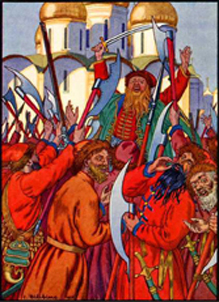 Part Three: Adventuring
Part Three: Adventuring
III – Game Mechanics
All Game mechanics are as detailed in Tunnels & Trolls (avaliable from Flying Buffalo)IV – Equipment
Weapons
Timinits & Trolls is an old-school FRP aimed at reliving the thrill of exploring dangerous ruins, killing the horrible monsters living therein, and returning to one’s village full of loot. Weapons are thus the main equipment most delvers will be interested in.| Weapon | STR needed | DEX needed | Damage dice + adds | Cost (guilders) | Weight (w.u.) | 2H |
| Axe | 17 | 8 | 4 | 40 | 150 | N |
| Axe, great | 20 | 10 | 5 + 3 | 50 | 190 | Y |
| Bow, composite | 15 | 15 | 4 + 3 | 150 | 60 | Y |
| Bow, elf | 15 | 18 | 6 + 5 | N/A | 50 | Y |
| Bow, self | 15 | 15 | 4 | 50 | 50 | Y |
| Broadsword | 15 | 10 | 3 + 4 | 50 | 120 | N |
| Dagger | 1 | 4/10 | 2 + 1 | 20 | 16 | N |
| Footman’s lance | 10 | 10 | 4 | 30 | 120 | Y |
| Hammer, war | 16 | 3 | 5 + 1 | 50 | 300 | N |
| Hatchet | 6 | 6 | 2 + 3 | 25 | 50 | N |
| Javelin | 5 | 7 | 2 | 35 | 30 | N |
| Mace, heavy | 17 | 3 | 5 + 2 | 40 | 200 | Y |
| Maul | 19 | 6 | 6 + 1 | 40 | 220 | Y |
| Pike | 15 | 12 | 6 | 30 | 100 | Y |
| Rapier | 10 | 14 | 3 + 4 | 100 | 20 | N |
| Scimitar | 10 | 11 | 4 | 50 | 100 | N |
| Short sword | 7 | 3 | 3 | 25 | 30 | N |
| Spear, boar | 13 | 8 | 4 + 2 | 20 | 100 | Y |
| Spear, common | 8 | 8 | 3 + 1 | 15 | 30 | N |
| Spear, long | 5 | 12 | 5 | 20 | 120 | Y |
| Sword, two-handed | 17 | 14 | 5 + 2 | 150 | 160 | Y |
Armour
After his weapon(s), armour is often a delver’s best friend. Umathings are limited to chainmail. Malki may wear any armour (provided they can buy it!).
| Name | STR needed | Protection Points | Cost (Guilders) | Weight (w.u.) |
| Banded mail | 13 | 13 | 320 | 450 |
| Chainmail | 12 | 12 | 250 | 360 |
| Cuirbouilli | 8 | 7 | 170 | 160 |
| Heavy Cloth | 3 | 1 | 20 | 30 |
| Heavy Plate | 19 | 20 | 1300 | 700 |
| Lamellar | 13 | 9 | 200 | 320 |
| Plate | 16 | 18 | 460 | 450 |
| Quilted | 6 | 3 | 50 | 100 |
| Ring Mail | 14 | 13 | 435 | 410 |
| Scale Mail | 10 | 8 | 210 | 300 |
| Soft Leather | 7 | 5 | 50 | 75 |
Shields
Protection provided by a shield is on top of armour but limits the delver to 1H weapons.
| Name | STR needed | Protection points | Cost (Guilders) | Weight (w.u.) |
| Buckler | 2 | 3 | 10 | 75 |
| Pavise | 14 | 7 | 130 | 700 |
| Target shield | 10 | 4 | 35 | 300 |
| Tower shield | 12 | 6 | 100 | 500 |
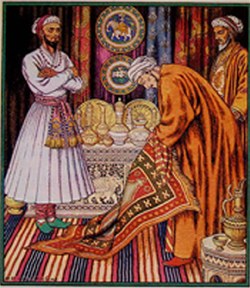 General Equipment
General Equipment
Prices are per Umathing markets and fairs. Prices in the countryside are higher but usually entail barter rather than the exchange of metal currency; prices are usually lower in large Malki cities, except for animals.
| Item | Cost | Weight |
| Bow saw | 50 | 30 |
| Crowbar | 120 | 200 |
| Draught hog | 350 | N/A |
| Grappling hook | 30 | 50 |
| Lantern | 12 | 20 |
| Oil, flask | 15 | 5 |
| Rations, 1wk | 35 | 15 |
| Riding horse | 3600 | N/A |
| Rope (15m) | 50 | 100 |
| Tinderbox | 4 | 2 |
| Torch | ¼ | 1 |
| Wagon | 1000 | N/A |
| War horse | 9000 | N/A |
V - Magic
There are four kinds of Magic in Timinits & Trolls: Wizard Magic, Hedge Magic, Cult Magic, and Spirit Magic.Both Wizard and Cult Magic function with spell lists. Hedge and Spirit Magic are freeform.
Magic is fuelled by the delver’s POW characteristic points.
Wizard Magic (or Wizardry)
This is the magic system as described in the standard Tunnels & Trolls rules. Wizardry is sorcery. It deals in revelations offered by the Invisible God that allow practitioners to manipulate the physical nature of the universe. It allows them to bend nature rather than channel it, which means that Umathings and many other Pamaltelan cultures view sorcery with suspicion and hatred. Wizardry does not need faith or virtue or whatever, just knowledge and the requirements of the specific spell (which may impose specific taboos or requirements).If, for any reason, a delver who is not a Templar or a Wizard has access to learning Wizardry, than he must learn each level of power-up spells as a separate spell.
Casting a Wizard Magic spell requires:
- knowledge of the relevant spell,
- minimum INT and DEX,
- and a successful INT skill roll of the level of the spell being cast
If the target has a POW greater than the caster’s POW, the spell doesn’t take effect, but the target loses as many POW characteristic points as spent by the spell caster. If the target has a POW less than or equal to the caster’s, the spell takes effect.
 Hedge Magic
Hedge Magic
As written above, Hedge Magic is freeform. Casting a Hedge Magic spell only needs the Hedge Magic talent, and a successful Hedge Magic skill roll.Use the following guidelines for the spells:
Effect: 1D per level of difficulty of the Skill Roll
Cost: same as effect; if no die is rolled 5 POW characteristic points per level
Duration: instantaneous or one-use, but the GM may allow an extended effect by increasing the Skill Roll level
Examples:
- healing 1D hit points is a 1st level spell, and costs 1D [same as what has been rolled] POW characteristic points
- adding 2D to one’s combat adds is a 2nd level spell and costs 2D [as rolled] POW characteristic points
- adding 1D to one’s armour points is a 1st level spell, and costs 1D [as rolled] POW characteristic points
- decreasing the difficulty of a ranged combat roll by 2 levels is a 2nd level spell and costs 10 POW characteristic points
Hedge Magic spells are often self-centred. Should someone cast a Hedge Magic spell onto an unwilling target, then the following apply:
If the target as a POW greater than the caster’s POW, the spell doesn’t take effect, but the target loses as many POW characteristic points as spent by the spell caster.
If the target has a POW less than or equal to the caster’s, the spell takes effect.
Cult Magic
Cults are a very important aspect of the magic-rich world of Glorantha. Joining a Cult is abstracted by spending 500 AP.In gaming terms, one of the main benefits of becoming a Cult initiate is getting access to Cult Magic spells. With regards to Cult Magic, a Cult initiate becomes an Acolyte. An Acolyte is basically a “dual classed" character – and the only instance of such a character in Timinits & Trolls – the first class is whatever class the character already had, and the second class is Acolyte. The character level of the latter is computed using POW only.
Acolytes are limited to Level 5. Upon reaching the 5th level as an Acolyte, the character must decide if he devotes himself entirely to his cult, in which case he changes his character class and fully becomes a Priest, thereby losing all his previous class benefits (Talents however remain at whatever value they were), or if he remains an Acolyte, ‘stuck’ at Level 5, and continues his progression in his ‘other’ character class.
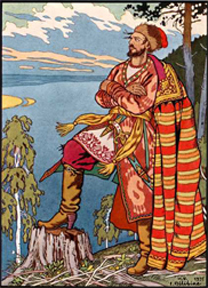 Acolyte/Priest Description
Acolyte/Priest Description
(greatly inspired by Mirabile Dictu! Priests as Characters in T&T; Dorothy V. March, Sorcerer's Apprentice issue 17)
Background: Any (except precluded classes).
Requisites: POW & CHR must be equal to or larger than 10.
Primary characteristics: POW only.
Talents: Whatever Talents the initiate already had.
Combat:- Acolytes may use the same weapons as their ‘other’ character class.
- Priests may be skilled in the use of any one class of weapons, of a type sacred to or associated with their Cult. Priests may also use any form of armour unless it is precluded by the tenets of the Cult.
A starting Acolyte knows all 1st level Cult Magic spells. Spells beyond that level must be purchased from the temples or churches of the cult.
Casting a Cult Magic spell requires:
- knowledge of the relevant spell,
- minimum CHR,
- and a successful CHR skill roll of the level of the spell being cast.
If the target as a POW greater than the caster’s POW, the spell doesn’t take effect, but the target loses as many POW characteristic points as spent by the spell caster. If the target has a POW less than or equal to the caster’s, the spell takes effect.
Cult magic spells are described in issue 17 of the Sorcerer's Apprentice; if the GM does not have access to them, he should devise his own cult magic spells for each cult in his campaign, using the wizardly spells as examples, and based on the particular tenets of the cults
Spirit Magic
Spirit Magic is the province of shamans, which in Timinits & Trolls are only available as NPCs.Shamans channel the power of their ancestors and of the spirits of their land using the following rules (greatly inspired by the following: You Are Chosen).
Shamans communicate with the ancestors of the tribe and the spirits of Pamaltelan nature. Shamans do not normally adventure and hence are used as NPCs in Timinits & Trolls. A Shaman must choose a main ancestor or spirit as his or her main source of channelling power.
Background: Tribal Umathing or Olodo only.
Requisites: CHR must be equal to or larger than 15.
Primary characteristics: STR, CON, CHR, LK.
Talents:
- Channelling (CHR — roll 2D instead of 1D; doubles add and roll over)
- Choose three other starting Talents.
Combat: Shamans only get half of the calculated combat adds.
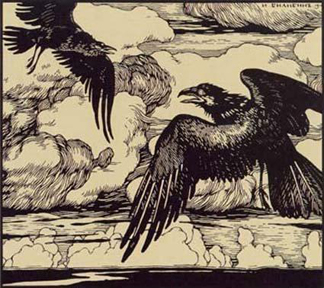 Magic:
Magic:Shamans may only cast Spirit Magic. Spirit Magic works as follows:
Whenever the Shaman wants to channel his spirit’s power, he must vocally petition his spirit. The player picks a Skill Roll level on Channelling: if the roll is successful, he can apply that many dice as a temporary bonus or penalty to a specified ability score, Skill Roll, attack, or defence. If the roll is a failure, the Shaman loses CHR characteristic points equal to the Skill Roll level, which the Shaman can only recover through prayer [ten minutes of uninterrupted prayer allow a Shaman to recover one CHR characteristic point] or by performing a liturgy to the Shaman's spirit [the liturgy takes place on a Holy Day and lasts at least one hour but it allows the Shaman to recover any lost CHR characteristic points up to his full CHR score]. On a fumbled roll, the Shaman can’t use Spirit Magic again until he has a chance to pray or perform a liturgy.
Here are some examples of Spirit Magic use:
- Kolat the Kolating asks the Thunderer to charge his hammer with a booming peal. The player calls a Level 3 SR on Channelling, and succeeds. The blessed attack does three extra dice of damage, one time.
- Umbra, incarnate of the Lord of Shadows, commands the darkness to conceal her attempt to sneak into a chieftain’s bedchamber. She makes a Level Two SR on Channelling, gaining a 2-die bonus to her Stealth Skill Roll. [These two dice act as an ability bonus, and don’t count for DARO or prevent automatic failure if the stealth roll fumbles.]
- Faith Healer Fhred wants to heal a mortally-wounded companion, so he utters a prayer along with a Level Five Skill Roll on Channelling. If he makes it, his fallen friend recovers five dice of hit points.
- Nuala, prophet of the Flame of Pamalt, asks the flames to shield a sleeping chieftain from the assassin who snuck into his bedchamber. She makes a level 4 SR on Channelling, granting the chieftain 4 dice of protection when the flames blaze up against a single blow.
The effects of Spirit Magic can be subtle or dramatic, depending on the situation. They may even appear spell-like, but their mechanical impact is limited to the bonus or penalty they confer, and whatever narrative consequences the GM deems suitable.
The range of such blessings and curses is constrained only by the deity’s domain and the GM’s discretion; likewise with the timing: a Shaman could utter a blessing that affects events instantly or far in the future. The duration is usually limited to one action or one combat round, but the GM may allow an extended effect by increasing the Skill Roll level.
A Shaman of level 6+ may also Astral Travel, a spell-like power similar to the 11th level spell Ghostly Going, but which only applies to himself. The POW cost of Astral Travel is as follows:
| POW spent | Effects |
| 10 | The Shaman may Astral Travel in the mundane world in a 10km radius |
| 20 | The Shaman may Astral Travel in the mundane world in a 100km radius |
| 30 | The Shaman may Astral Travel anywhere in the mundane world |
| 40 | The Shaman may Astral Travel in mundane world and in the spirit world |
| 50 | The Shaman may Astral Travel in the mundane world, in the spirit world, and in other people’s heroquests
|
Organisation: Shamans are loners and can't join any organisation. However, Shamans from any given tribe form a loose organisation of sorts, and can sometimes call upon their brethren for succour.
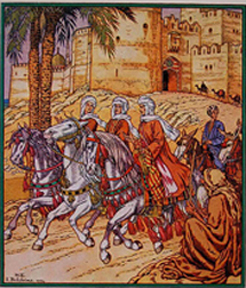 VI - Foes
VI - Foes
Players used to playing Sartarite characters in Third Age Glorantha will really feel like total strangers in Timinits & Trolls; Chaos is weak in Second Age Glorantha, there is no Lunar Empire, and the Empire of the Land and Sea is on the wane.Timinits & Trolls adventures are hence going to be rather “old school" in style, which is actually what this game is all about: the God Learners have left many ruins behind, where crazed sorcerers are still engaging in forbidden research, and the Zistorites, despite their downfall, have also left many uncontrolled weird machines.
Chaotic monsters are likely to be replaced by undead in terms of monstrous foes: Nontraya the Spurned is always seeking to harm Ernamola the Earth Sister (Ernalda), and as such is likely to be the main antagonist of the Umathings.
Players used to playing Sartarite characters should also be used to mostly human campaigns with very scarce non-human presence, except for the occasional Uz. Umathela is different; non-humans are very much present and also generally bellicose. Even Timinits, who are friendly to the Malki, are hostile towards Umathings.





